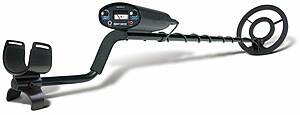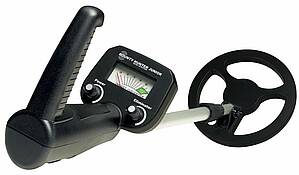

Apart from professional use at security counters or food controls, a metal detector is also perfect for exciting treasure hunts with the whole family. Because all around us, just below the surface of the earth, there are precious metals just waiting to be found: Coins, jewellery, precious metals and even antiques.
Metal detectors for big and small
We at Bresser know that the thirst for adventure and research is not only something for the youngest and therefore we have metal detectors in different versions with our series BOUNTY HUNTER, for children and beginners as well as for professionals. Because metal detecting is a great hobby for adventurers of all ages. With the high-quality metal detectors of the BOUNTY HUNTER series you can search for and filter for different metals depending on the construction and frequency setting. The highly sensitive search coils work precisely and are long-lasting.
With our BOUNTY HUNTER Junior, for example, we have a metal detector with a compact and ergonomic design in our range. The audio feedback is based on the signal strength and makes it easier for beginners to learn how to use the metal detector correctly in treasure hunting.
Our BOUNTY HUNTER Tracker IV is the right metal detector for advanced beginners. It is easy to use, lightweight and extremely efficient in operation. The Bounty Hunter Tracker IV metal detector detects all metals. It detects through dirt, stone, wood and mud - and the coil can even be immersed in water.
For serious advanced users we offer the Discovery 3300 in the BOUNTY HUNTER series - the device with the greatest search depth of all metal detectors in the Bounty Hunter Discovery series! It finds coin-sized objects in 11-inch (28 cm) depth and larger objects up to 4 feet (122 cm) deep! The metal detector is equipped with, among other things, a manual ground level control, a numerical target value system (0-199) for object identification, a digital 11-segment target recognition, 7-segment target elimination indicators, coin depth indicator and an acoustic 4-tone signal.
Rules of the treasure hunt
Searching with the metal detector is generally permitted throughout Germany (except in Schleswig-Holstein). You do not need a permit to search for non-soil or cultural monuments. Before entering private properties, please obtain the owner's permission.
In order to go on a real treasure hunt with the metal detector, you need an excavation permit (available from the state archaeologists) and the permission of the owner of private property.
Here the search is particularly worthwhile:
Bathing beaches and playgrounds, public parks and fairgrounds
Fields
Due to centuries of cultivation, there is a high density of finds
Mills
Mills were once the scene of intensive delivery traffic. Because in former times only cash was used for payment, you are most likely to find coins
Bridges and medieval highways
Once upon a time, coins were thrown into the water as good luck charms when crossing bridges. The roads in the Middle Ages were not only the connection between large cities, but also military, trade and pilgrim routes. Today they are almost forgotten, but some are still recognisable as hollow roads through our forests.
Castles and castle ruins
This is where the chance of finding valuable archaeological finds or antiques is greatest. As a rule, however, you will need a permit here.
Under no circumstances should you search here:
Marked and unmarked archaeological monuments
Cemeteries and graves (also former burial grounds such as megalithic tombs)
Within forests and unmanaged meadows
Historical places (battlefields, camps)
Can I keep what I find?
No. Every find automatically belongs to the state. With the exception of Bavaria: only in this federal state is the Hadrian's division valid. The law dates back to the Roman Emperor Hadrian and states that finds that cannot be clearly assigned to one owner belong half to the finder and half to the owner of the land on whose ground the treasure was discovered.
As a rule, you should report finds to the responsible state archaeologist in your federal state. Report ammunition finds to the police and under no circumstances dig them up on your own.
And now: Have fun and success on your treasure hunt!

 Deutsch
Deutsch
 English
English
 Francais
Francais
 Español
Español
 Italiano
Italiano
 Nederlands
Nederlands
 Polski
Polski

